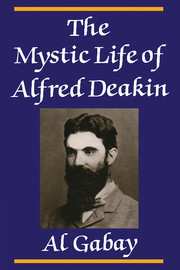7 - The Religion of ‘the Best’
Published online by Cambridge University Press: 05 March 2012
Summary
Come ill or well, the cross, the crown,
The rainbow or the thunder,
I'll fling my soul and body down
For God to plough them under.
R. L. StevensonDeakin's encounters with what he termed the ‘invisible’ were rare. Apart from some undefined raptures and an uncomfortable period as ‘impressional writing’ medium in youth, two remarkable auditions comprise virtually the total of Deakin's recorded paranormal experiences. The first experience came in October 1899 when, absorbed in prayer on behalf of a friend, Deakin suddenly heard a ‘spirit’ voice. A decade later, as he awoke by the seaside in the early morning he heard another voice, in that liminal zone of enduring fascination to his inner life, a ‘monition’ coming from within yet somehow outside his own being, and offering gentle counsel at a time when both his inner world and public career were crumbling.
An increasing reliance upon his own spiritual resources had become a salient feature of Deakin's inner life at least since the Grand Prophecy. He still discerned ‘signs’ in the course of events, and as the gospels and experience narratives have illustrated, he still held out a hope, at least in imagination, for a sudden and cataclysmic illumination. But these two auditions brought fundamental changes in Deakin's inner life, and the last part of this study explores their continuing, and increasing, spiritual significance to Deakin, and their relation to his other writings and to his political career, as boundaries were diminishing between these departments of his life.
- Type
- Chapter
- Information
- The Mystic Life of Alfred Deakin , pp. 138 - 172Publisher: Cambridge University PressPrint publication year: 1992



